Subjects (Master in Transport in Africa)
Detailed content of the modules of the Master in Transport and Logistics in Africa
Detailed content of the Modules and subjects of the Master in Transport and Logistics in Africa taught by EENI Global Business School.
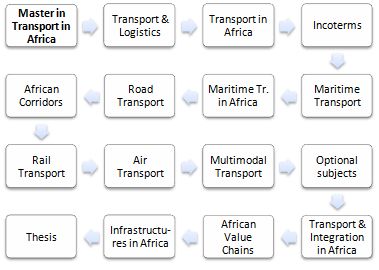

- Optional subjects of the Master in Transport and Logistics in Africa
- Download the syllabus (PDF) of the Master
- Download the syllabus (PDF) of the Related Subjects to the Transport in Africa
ECTS = European Credit Transfer and Accumulation System
 Enrol / Request for Information
Enrol / Request for Information

Subjects of the Master in Transport and Logistics in Africa.

Introduction to the International Transport and Logistics (5 ECTS).
- International Logistics and International Trade
- Selecting a mode of International Transport
- Transport Documents related to International Trade
- International transport chain
- Authorized Economic Operator
- Costs and insurance of International Transport
- Export Packaging
International Federation of Freight Forwarders Associations (FIATA).
- Negotiable Combined Transport Bill of Lading (FBL)
- FIATA Multimodal Waybill FWB
- Electronic FIATA Bill of Lading
- Warehouse Receipt
- Forwarders Certificate of Receipt (FIATA FCR)
- Forwarders Certificate of Transport (FCT)
- International Convention for Safe Containers
- Customs Convention on Containers
- Convention Relating to Temporary Admission
The objectives of the subject “Introduction to International Transport and Logistics” are:
- To have a global vision of the logistics and international transport applied to the International Trade
- To understand the functioning of the global transport chain
- To know the different techniques of export packaging and the importance of the containers
- To understand the basic concepts related to the documents, costs and insurance of International Transport
- To analyze the main documents of the FIATA
Introduction to the transport in Africa (1 ECTS)
- Introduction to the transport in Africa
- African Regional Transport Infrastructure Network
- Economic costs of the transport inefficiencies in Africa
- Forecast Demand for the Transport in Africa
- African Transport Outlook 2040
- Case Study:
- Ethiopian Airlines, the Best Airline in Africa
- Bollore Logistics in Africa
The objectives of the subject “Introduction to the transport in Africa” are:
- To know the global situation and trends of the African transport
- To analyze the African Regional Transport Infrastructure Network
- To understand why the transport inefficiencies make the transportation costs in Africa more expensive
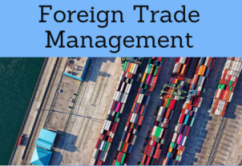
Incoterms® 2020 (2 ECTS)
- Introduction to the Incoterms
- What are the Incoterms® 2020?
- Key changes to the Incoterms® 2020
- The Review of the Incoterms® FCA (Free Carrier)
- The change from DAT (Delivered at Terminal) to DPU (Delivered at Place Unloaded)
- Different levels of insurance coverage under CIF and CIP
- Associated costs for each Incoterm (article A9 / B9)
- Analysis of the Incoterms® 2020
- Incoterms® 2020 and international transport
- Incoterms® 2020 for sea and inland waterway transport: FAS (Free Alongside Ship) - FOB (Free On Board) - CFR (Cost and Freight) - CIF (Cost, Insurance & Freight)
- Incoterms® 2020 for any mode of transport: EXW (Ex Works) - FCA (Free Carrier) - CPT (Carriage Paid To) - CIP (Carriage and Insurance Paid to) - DAP (Delivered At Place) - DPU (Delivered at Place Unloaded) - DDP (Delivered Duty Paid)
- How are they used?
- Criteria for selection of the Incoterms® 2020
The objectives of the subject “Incoterms® 2020” are the following:
- To understand the importance of the Incoterms® 2020 in International Trade
- To know how the Incoterms® 2020 are used in International Trade transactions
- To identify the risk, cost, and formalities according to the selected Incoterm
- To understand the responsibilities of the exporter and the importer under the Incoterms® 2020
- To know how to calculate the export prices based on the Incoterm
Maritime Transport (5 ECTS)
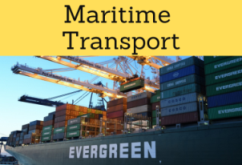
- Introduction to the Maritime Transport
- International Maritime Organization
- International Chamber of Shipping
- Regular lines and charters
- Freight and insurance of the Maritime Transport
- Maritime Transport Agents
- Maritime Transport Documentation.
- Bill of Lading (B/L)
- Electronic FIATA Bill of Lading
- The largest ports of the world
- International Rules related to the Maritime Transport
- Analysis of the International Maritime Trade
The objectives of the subject “Maritime Transport” are the following:
- To understand the importance of the Maritime Transport in Foreign trade
- To learn about the functioning of the Maritime Transport
- To understand the role of the main institutions related to the Maritime Transport (International Maritime Organization, International Chamber of Shipping)
- To know the key players of the Transport of Goods by Sea
- To know the key concepts related to the International Maritime Transport (freight, safety, stowage, risks...)
- To examine the different concepts related to the insurance and the main clauses of the Maritime Transport
- To analyze the Maritime Transport documents (Bill of Lading) and how to fill them out
- To study the main rules and conventions of the maritime cargo transport (Rotterdam, Hamburg, FAL Rules)
Download the syllabus (PDF) of the module.
Maritime Transport in Africa (3 ECTS)
1- Introduction to the Maritime Transport in Africa.
- Revised African Maritime Transport Charter
- Durban Resolution on Maritime Safety, Maritime Security and Protection of the Marine Environment in Africa
- Port of Lagos (Nigeria)
- Port of Abidjan (Ivory Coast)
- Port of Dakar (Senegal)
- Ports of Tema and Takoradi (Ghana)
- Port of Lomé (Togo)
- Port of Cotonou (Benin)
- Port of Douala (Cameroon)
- Port of Pointe Noire (Congo)
- Port of Luanda and Port of Lobito (Angola)
- Ports of Gabon
- Ports of Equatorial Guinea
- Port of Mombasa (Kenya)
- Port Sudan (Sudan)
- Port of Dar es-Salaam (Tanzania)
- Ports of Beira, Nacala and Maputo (Mozambique)
- Port of Djibouti
- Ports of Madagascar
- Egyptian ports
- Port of Durban (South Africa)
- Richards Bay, East London, Ngqura, Port Elizabeth, Mossel Bay, Cape Town, Saldanha
- Port of Walvis Bay (Namibia)
6- Maghrebian Ports.
The objectives of the subject “Maritime Transport in Africa” are the following:
- To know the state of the Maritime Transport in Africa
- To analyze the features of the largest ports in Africa
- To know how to access the fifteen African landlocked countries through the transport corridors and ports
- To analyze the difficulty of the Containerization, bottlenecks and high port costs in Africa
- To evaluate the disconnection between the rail and road transport networks and the African ports
Road Transport (10 ECTS)

- Introduction to the Road freight transport
- International Road Transport Union
- Convention on the Contract for the International Carriage of Goods by Road
- Consignment Note (CMR)
- TIR Convention. TIR Carnet
- Insurance and costs of the Road Freight transport
- Safe Load Securing for Road Transport
The objectives of the subject “International Road Transport” are the following:
- To understand the importance of the Road Freight transport in International Trade
- To understand the role of the International Road Transport Union (IRU)
- To learn the key concepts related to International Transport by road
- To know the key players of the Road Transport
- To study the main Conventions (CMR, TIR) of the International Road Transport of goods
- To analyze the documents related to the Transport of Goods by road (Consignment Note, e-CMR) and how to fill them out
- To know how stow safely a load to be transported by a lorry
Download the syllabus (PDF) of the module.
African Transport Corridors (3 ECTS)
- Introduction to the African Transport Corridors
Trans-African Road Network
- Lagos-Mombasa Corridor
- Algiers-Lagos Corridor
- Cairo-Gaborone Corridor
- Cairo-Dakar Corridor
- Trans-Sahelian Highway (Dakar-N’Djamena Corridor)
- Tripoli-Windhoek Corridor
- Dakar-Lagos Corridor
- N’Djamena-Djibouti Corridor
- North-South Corridor
- Northern Corridor
- Central Corridor
- Beira-Lobito Corridor
- Lobito Corridor
- Asia-Africa Corridor
The objectives of the subject “African Transport Corridors” are the following:
- To know the state of the Road Freight transport in Africa
- To analyze the four types of corridors in Africa (unimodal, multimodal, logistic and economic)
- To learn about the characteristics of the main African transport corridors
- To identify the causes of the high costs of the Road Transport in Africa
- To know how to access to the African landlocked markets through the transport corridors
- To understand the concept of a corridor as an engine of the African socio-economic development
Rail Transport (5 ECTS)
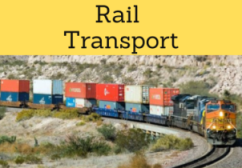
- Introduction to the Rail freight transport
- Intergovernmental Organization for International Carriage by Rail. COTIF Convention (Rail)
- International Union of Railways
- International Rail Transport Committee(CIT)
- Organization for Cooperation between Railways (OSJD)
- CIM, CIT Rail Rules
- Costs and insurance of the Rail freight transport
- Rail Transport Document: CIM Consignment Note
- Economy and railway operations
- Introduction to the African rail transport system
- Current state of the African railway infrastructure
- The need for the Rail Transport in Africa
- Analysis of the Railway Systems in Botswana, Tanzania, Zambia, Cameroon, Kenya, Madagascar, Morocco and Senegal
- The current situation of the African railway market
- Railway Business models in Africa
- Projects for new railways in Africa
Eurasian Rail Corridors:
- Introduction to the Eurasian rail cargo transport
- Trade volume distribution between the Northern and Southern routes
Combined Transport in Europe
- Rail/Road combined transport in Europe
- The European rail/road combined transport market
- General framework and key elements of the Combined Transport in Europe
The objectives of the subject “International Rail transport” are the following:
- To understand the importance of the Rail Transport in Foreign Trade
- To know the pillars of the International Rail Transport Law
- To know the key players of the Rail Freight transport
- To analyze the state of the Rail Transport in Africa
- To explore the railway systems in Botswana, Tanzania, Zambia, Cameroon, Kenya, Madagascar, Morocco and Senegal
- To understand the role of the International Rail Transport Committee and the Intergovernmental Organization for International Carriage by Rail
- To analyze the documents related to the Rail Transport (CIM Consignment Note)
- To study the main Conventions related to the Rail Transport of goods (COTIF Convention, CIM)
Download the syllabus (PDF) of the module.
Air Transport (4 ECTS)
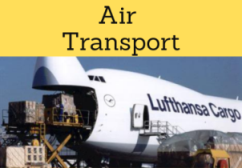
- Introduction to the Air cargo transportation
- Single African Air Transport Market
- IATA
- International Civil Aviation Organization (ICAO). Chicago Convention
- Convention for the Unification of Certain Rules for International Carriage by Air
- Loading devices for the Air Transport
- AWB Document (Air Waybill). e-AWB
- The global air transport market
- Main airports of the world
The objectives of the subject “Air Transport” are the following:
- To understand the importance of the Air Transport in Foreign Trade
- To learn about the role of the International Civil Aviation Organization (ICAO) and the International Air Transport Association (IATA)
- To understand the global air cargo supply chain
- To analyze the documents related to the Air Transport (Air Waybill, e-AWB)
- To study the main Conventions related to the International Air Transport
- To know the pillars of the Single African Air Transport Market
- To know the global situation of the International Air Transport
Download the syllabus (PDF) of the module.
Multimodal / Combined Transport (5 ECTS)
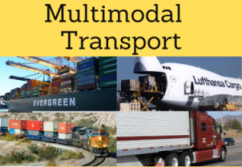
- Introduction to the Multimodal / Combined Transport
- Intermodal Loading Units (ILU)
- Intermodal Transport Chain
- Multimodal Transport Operator
- United Nations Convention on International Multimodal Transport of Goods
- United Nations Convention on Contracts for the International Carriage of Goods Wholly or Partly by Sea (Rotterdam Rules)
- Combined Transport Bill of Lading (CTBL) of the FIATA
- Insurance and costs of the Multimodal Transport
- Road-Rail Combined Transport
The objectives of the subject “Multimodal / Combined Transport” are the following:
- To understand the importance of the Multimodal/Combined Transport in Foreign Trade
- To learn the key concepts related to the Multimodal transport
- To analyze the Combined Transport Chain and its main actors
- To know the role of the FIATA (International Federation of Freight Forwarders Associations)
- To study the main Conventions related to the Multimodal/Combined Transport
- To know the features of the Road-Rail Combined Transport
- To analyze the documents related to the Multimodal/Combined Transport
Download the syllabus (PDF) of the module.
Transport and Regional integration in Africa (1 ECTS)
- Assessing Regional Economic Integration in Africa (ARIA)
- Transport and integration in the African regional economic communities (SADC, COMESA, UEMOA, CEMAC...)
- Transportation corridor initiatives
- Physical integration: road, rail and air transport
- Mainstreaming the African regional integration
- Harmonization of the rules of origin in Africa
- Intra-African trade facilitation programs
- Best practices in the African regional integration
- Free movement of persons and right of establishment in Africa
The objectives of the subject “Transport and Regional integration in Africa” are the following:
- To study the level of the transport integration in Africa
- To analyze the state of integration and transport in the different African economic communities
- To know the programs on trade facilitation, rules of origin, market access... in the African continent
- To learn about the best practices related to the African Regional Integration

African Continental Free-Trade Area.
- Introduction to the African Continental Free-Trade Area
- The strategic importance for Africa of a Continental Free-Trade Area
- Benefits of the African Continental Free-Trade Area: increased intra-African trade and economic integration
- Evaluation of the economic impact of the African Continental Free-Trade Area
- Potential scenarios to reach the African Continental Free-Trade Area:
- Free Trade Zone of North and West Africa (CEDEAO, CEN-SAD, CEEAC and AMU)
- Free Trade Zone of Eastern and Southern Africa (COMESA, SADC, EAC, IGAD) - Tripartite Agreement
- Economic effects of a Continental Customs Union
The objectives of the subject “African Continental Free-Trade Area (AfCFTA)” are the following:
- To understand the objectives and the state of the African Continental Free-Trade Area
- To evaluate the advantages and the economic impact on the African Markets of the African Continental Free-Trade Area
- To analyze the two possible scenarios for the realization of the African Continental Free-Trade Area
ICT for Regional Trade and Integration in Africa.
- Introduction to the Information and communications technology (ICT) for Regional Trade and Integration in Africa
- ICT Initiatives of the Regional Economic Communities
- e-Commerce: The next growth African frontier
- ICT and Trade Facilitation in Africa
- Automated Terminal Operating System
- Automated System for Customs Data and Management (ASYCUDA)
- Case Study:
- Kenya Ports Authority and Kilindini Waterfront
- Online Nigerian retail sites (DealDey, Konga, Jumia)
- National single window (NSW) in Ghana, Namibia, Malawi, and Mozambique
- ICT and transport corridors
- African mobile revolution
- Cross-border mobile payments
The objectives of the subject “ICT for Regional Trade and Integration in Africa” are the following:
- To know how the information technologies can benefit the African regional integration, trade facilitation, African corridors and inter-African trade
- To analyze the concept of Electronic commerce as the next frontier of the African growth
- To know the importance of the cross-border mobile payments in Africa
- To study different successful cases of application of the ICT to the Intra-African trade
African value chains:
- Introduction to the African Value Chains
- African Growth Poles
- How can take advantage the African enterprises of the value chains?
- Trade Facilitation
- Rules of Origin and transport costs
- Export costs in Africa
- One-stop border post
- Case Study:
- Cocoa Value Chain in West Africa
- Shoprite (African largest food retailer)
The objectives of the subject “African value chains” are the following:
- To know how the intra-African trade can benefit from the African value chains
- To analyze the impact of the African Value Chains on the transport and export costs in Africa
- To assess the importance of the One-stop border post in Africa
- To study success stories of the African Value Chains (Egyptian textile sector, cocoa value chain in West Africa...)
Infrastructures in Africa
- Introduction to the Infrastructures in Africa
- Analysis of the infrastructures in Africa
- Institutional framework
- Infrastructure Consortium for Africa
- African Infrastructure Knowledge Programme
- Trends in the Infrastructure Investments in Africa
- Infrastructure and economic growth in Africa
- African Regional Integration and infrastructures
Programme for Infrastructure Development in Africa
- Introduction to the Programme for Infrastructure Development in Africa (PIDA): development through the regional integration
- Key sectors of the Programme for Infrastructure Development in Africa: Transport, Energy, ICT and Transboundary Water Resources
- Costs and investments of the Programme for Infrastructure Development in Africa
Road Infrastructure Costs in Africa
- Introduction to the road infrastructure costs in Africa
- Analytical Approach for the African Road Infrastructure Costs
- Unit Cost Curve by Project Size
African Road Safety Action Plan
- Introduction to the African Road Safety Action Plan
- The Five pillars of the African Road Safety Action Plan
- Road Safety Management
- Safer roads and mobility
- Safer vehicles
- Safer Road Users
- Post-crash response
 Master in transport en Afrique
Master in transport en Afrique  Master en Transporte en África
Master en Transporte en África  Mestrado em
Transporte na África.
Mestrado em
Transporte na África.
(c) EENI Global Business School (1995-2024)
We do not use cookies
Top of this page

